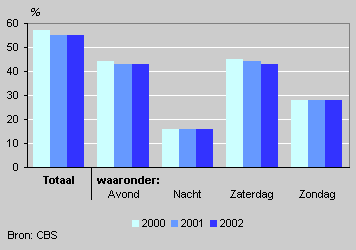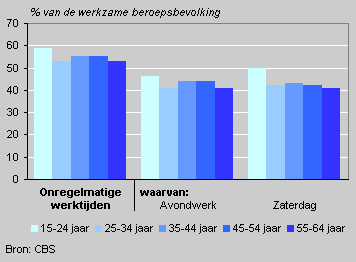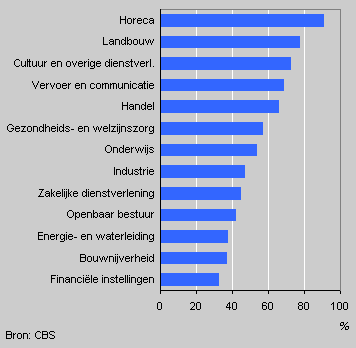More than four in ten employees work in the evening or on Saturdays

In 2002 more than half of the active labour force worked irregular hours. Most people in this group worked evening shifts or on Saturdays. Young people more often worked irregular hours than other age groups. Working irregular shifts was most common in the hotel and restaurant sector.
Active labour force by irregular working hours

More than half of employees work irregular hours
In 2002, 45 percent of the employed labour force only worked in the daytime on weekdays. The corresponding percentage for 2000 was 43. Consequently, more than half of the active labour force occasionally worked irregular shifts.
Most people working irregular hours worked in the evening and on Saturdays. Over 40 percent occasionally worked in the evening. Another 40 percent occasionally worked on Saturdays. Almost 30 percent sometimes worked on Sundays. With 16 percent, working night shifts was the least common. Compared to 2000 and 2001 these percentages hardly changed. Only working on Saturdays appears to have decreased slightly.
Irregular working hours by age, 2002

Many young people work on Saturdays
Young people more often worked irregular hours than other age groups: in 2002 nearly 60 percent of 15-24 year-olds worked irregular hours. Saturday work is especially common among younger people because pupils and students often work in addition to school or study. Young people also frequently work in the evening. Working irregular hours is the least common among people over the age of 55.
Irregular working hours by economic activity, 2002

Most irregular hours in hotel and restaurant sector
Employees in the hotels and restaurant sector, most often worked irregular hours. In 2002, nine in every ten employees in this sector worked irregular hours. Working in the evenings as well as on Saturdays and Sundays occurred frequently in this sector.
In agriculture over 75 percent of workers sometimes worked irregular hours. Other sectors where irregular hours were common were culture and other services, transport and communication, and trade.
Tanja Traag
Source: StatLine (Dutch only)